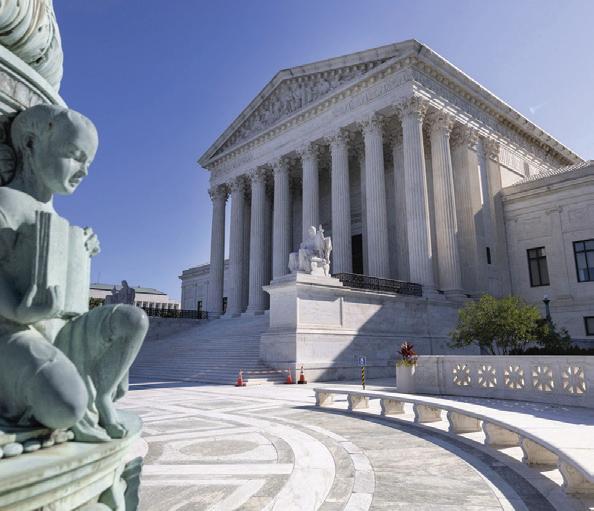
2 minute read
Supreme Court Hears Cases on Student Loans
By: Michael Bicksel ‘25 Contributor
The Supreme Court recently heard oral arguments in a case concerning President Biden’s ability to forgive student loans en masse. He claims authority under the HEROES Act, which authorizes the federal government to “waive or modify any provision … to ensure that recipients of student financial assistance … are not placed in a worse position financially … because of their status as affected individuals.” Biden argues that those affected by Covid (literally everyone) must therefore be eligible for relief since Covid has (and somehow remains) a national emergency. The Supreme Court was not asked to decide whether Covid should be an emergency, but whether the HEROES Act would be authorizing something so major it deserves more express Congressional intent.
The major questions doctrine, which has found some friends on the bench, posits that when the subject of a case is so politically or economically important it needs to be clearly authorized by Congress (surprisingly enough, the man who coined the term in a famous law article back in 1986 was thenCircuit Judge Stephen Breyer). The doctrine has gotten recent attention in the Court’s decision in West Virginia v. EPA from last term, when it found that the EPA needed clearer authorization to regulate emissions from existing plants. As many Court experts are saying, the justices seem poised to hand down a similar 6-3 or 5-4 decision against the Administration.
Biden’s camp has thus far argued two main points: one, that the plain text gives Biden the authority to do whatever he wants (so long as it is a national emergency, of course); and two, that even if it did not, student loan forgiveness is so important that the Court should uphold loan forgiveness anyway. There are a few problems with this response. First of all, claiming that the “plain text” authorizes the most sweeping unilateral education reform in American history based on an act of Congress passed just months after 9/11 and the subsequent invasion of Afghanistan is a stretch to say the least. It is fair to say that the Republican majorities in the House and (for a time) Senate, as well as President Bush would have some major questions about the HEROES Act authorizing the erasure of student debt twenty-two years later (and twenty years after its initial expiration date). As if that were not enough, arguing that student loan forgiveness is so important that it must be upheld either way (as some Democrats like Ayanna Pressley have supported) only concedes that it is, in fact, a major question.
If President Biden wanted to truly make ground-breaking change to our stagnant education system, he could have asked Congress, perhaps using some connections from his over forty years of service. Instead, he used a decades-old law created in the immediate aftermath of 9/11, intended to give relief to first responders and locals who suffered from the attacks, to justify some of the most life-altering reforms ever made to the American education system. Such strict interpretation has never been taken so seriously; perhaps then the “plain text” is not so plain after all.







